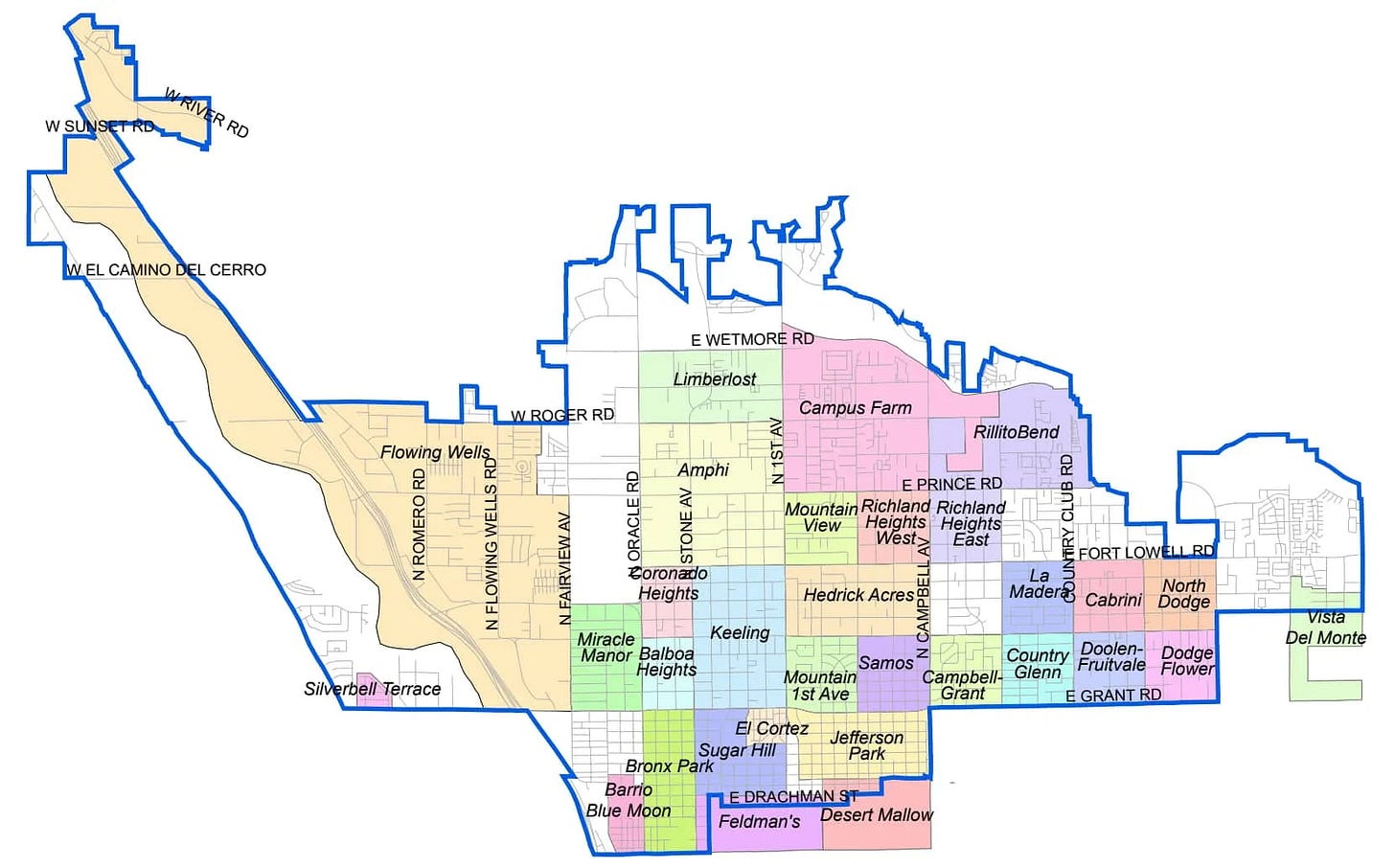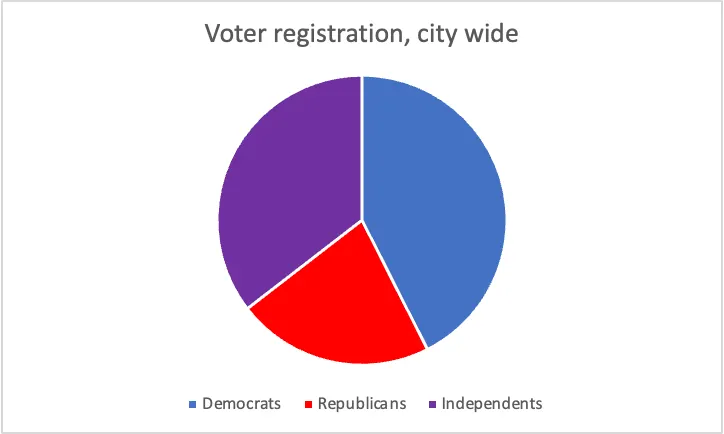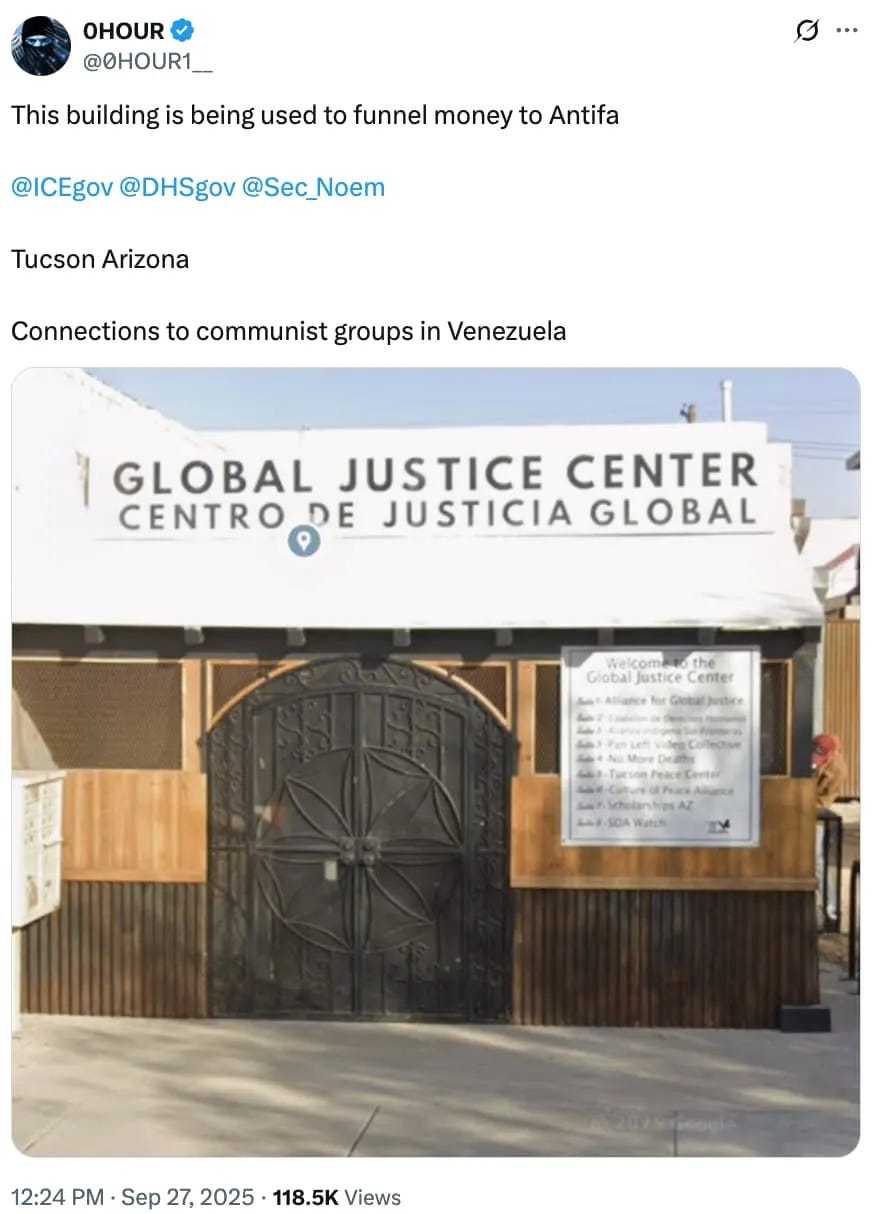Democracy made her do it
Wittenbraker, Round 3 … Grijalva Now! … And these are not the Antifa conspirators you seek.
Over the past few years, Tucson has gotten to know Janet “JL” Wittenbraker as a candidate.
Before she was running against Democrat Kevin Dahl for his seat on the Tucson City Council, Wittenbraker was the Republican nominee for both mayor of Tucson and one of the seats on the Pima County Board of Supervisors.
Wittenbraker has often been dismissed as a political longshot, but she nearly pulled off an upset in last year’s District 3 supervisor race, finishing with 43% of the vote.
Her political career began almost by accident. As a former staffer in the Tucson City Manager’s Office, she stopped by the Pima County Republican headquarters hoping to support a change at City Hall.
“I said, who are your candidates? I want to back that person. I have the financial means, I have the energy. I have the time. I wasn’t even a precinct committee member,” she said.
But when she learned no one was stepping up to challenge Mayor Regina Romero, Wittenbraker reluctantly ran herself.
It was a hard truth to swallow: If she didn’t run, probably no one else would. Tucson hasn’t had a Republican mayor since Bob Walkup, who served from 1999 to 2011.
Wittenbraker said she decided to run for the council this time because she is concerned about where the city is headed.
“I don’t like what I’m seeing in my commute to work. I don’t like the poverty. I don’t like the crime,” she said.
This year, she went back to party headquarters, hoping to recruit candidates for the City Council elections. Republicans managed to find a challenger in Ward 6, but struggled again in her home district of Ward 3, representing central and north Tucson.
So it’s little surprise that she’s running again.
But running almost nonstop for the past two years has come at personal cost, she notes.
Throwing her name into the ring meant she’s had to turn down two promotions in her professional career. But it’s worth it if she can nudge Southern Arizona government in a more conservative direction and inject her values into the public debate, she said.
“My purpose for running for office is the same (as last time) — that I don’t believe our government is serving at the consent of the governed. And I don’t believe we have diversity of thought on our council and very little on our board of supervisors,” Wittenbraker told us.
She argues that an all-Democratic City Council has created a siloed conversation that rarely strays from liberal talking points.
“We don’t have conversations,” Wittenbraker said. “I’ll use the safe sleeping site that will go up on Grant and Stone in Ward 3. There was no discussion of where other communities have tried it and failed.”
The safe-sleeping site would provide a dedicated camping area for women and nonbinary people experiencing homelessness. Wittenbraker said she attended a recent meeting about STAR Village and left with unanswered questions. Organizers, she argued, hand-picked which questions to answer and sidestepped concerns about how much money goes to program services versus third-party partners.
Looking ahead, Wittenbraker said the city is at a financial crossroads.
“You have to make tough decisions on what programs to cut or partially fund, and then fully fund those programs called out for by the charter, which happen to be public safety, roads, transportation, and also parks,” she said.
With voter-approved grants already covering many park upgrades, she believes city funds should be focused on first responders and road repairs. An opponent of the now-defeated Proposition 414, Wittenbraker has called for belt-tightening inside the city budget.
We asked her a hypothetical: What if Tucson hired 40 new police officers, at a cost of about $100,000 per officer per year?1 Where would the $4 million a year come from?
With a city budget of $2.4 billion, Wittenbraker argues there’s room to cut. That includes shelving Romero’s million-tree initiative.
“We would love to plant a million trees. We would. And I think we need the shade,” she said. “(But we) can’t afford it right now. So I’m going to ask you, the constituent, to do it.”
As an aside, the truly flexible portion of Tucson’s budget is closer to $750 million. Much of the $2.4 billion total goes to fixed obligations like pensions and bond payments, and hiring new officers would increase the city’s required contributions to the Arizona Public Safety Personnel Retirement System.
Democrats hold a clear advantage in the city’s voter rolls: About 42% of registered voters, compared to 22% Republican, and 35% independent.
As a Republican, Wittenbraker enters the general election at a disadvantage. Tucson’s charter requires that all voters — not just those in Wards 3, 5, and 6 — be able to cast ballots in ward races.2
That makes her bid a citywide race, one she hopes will rally Republicans and independents beyond her ward. It worked before: Walkup won the mayor’s seat as a Republican in 1999, and Steve Kozachik won his council seat in 2009.
But Wittenbraker insists Tucson is ready for a change, and says she’s fighting to give conservatives a voice on the council.
“There’s lots of ways we can fix Tucson. I don’t have all the ideas. I would bet if I was elected, some of my Democrat counterparts would also have ideas. We put them on the table. We don’t always agree. We hash through it. But knowing that we find common ground through open dialogue, not avoidance,” she said.
Mail-in ballots go out next month, and the city’s voter guide is expected to land in mailboxes in a few days.
Adelita Grijalva could be sworn in as Arizona’s first Latina Congresswoman as soon as tomorrow.
She’s already in Washington, D.C., meeting with fellow Democrats, but her actual swearing-in? That likely won’t happen on Tuesday.
House Speaker Mike Johnson has penciled it in for mid-October, when Congress is back in session and after results from all six counties are certified.
The catch here is that certification isn’t required before a new member takes the oath, and Grijalva is pressing Johnson to move faster.
She points to Virginia Democrat James Walkinshaw, who was sworn in just a day after his special-election win earlier this month. She wants the same treatment.
Arizona Secretary of State Adrian Fontes told us he already sent unofficial results to Washington last week — in his view, nothing is stopping Congress from moving ahead.
Johnson has told reporters he’ll wait until mid-October.
But Democrats see a potential loophole: The House is holding brief pro forma sessions, including one on Tuesday. And conveniently, Grijalva is in town.
We’ll be watching closely to see if Johnson changes course.
Cost of court: Former Arizona Sen. Justine Wadsack has dropped her civil rights claim against Tucson for giving her a speeding ticket, but an attorney for the city said she should still have to pay for their costs in preparing the case, per Capitol scribe Howie Fischer. Attorney Joseph Williams told a U.S. District Court judge that his firm spent time preparing arguments before Wadsack dropped her case — including preparing for a hearing Wadsack skipped to attend a political event — and she should have to pay $7,838.
Irony takes flight: Republican Rep. Juan Ciscomani faced Green Valley business owners at a Green Valley Sahuarita Chamber of Commerce roundtable last Tuesday, writes Dan Shearer for Green Valley News. Ciscomani hoped to hear how Trump’s Big Beautiful Bill created “pro-growth business tax provisions,” but instead local entrepreneurs pushed the representative about the “uncertainty” and higher prices for materials they face under Trump’s tariffs. Then, “as if he didn’t hear a word of it, irony took flight right over Ciscomani’s head,” Shearer wrote, as Ciscomani said it was the role of Congress to create environments where business owners can take risks and be successful.
“You need the rules of the game to be certain, to be stable. Then that gives you the confidence to get out there and take the risk you need to take,” Ciscomani said.
Further reprieve: A federal judge in Tucson blocked the Trump administration from immediately deporting dozens of Guatemalan and Honduran children who came to the U.S. alone, per the Associated Press. U.S. District Judge Rosemary Márquez extended the injunction she issued earlier this month that would have expired on Friday. In her ruling last week, she echoed a similar ruling by a judge in Washington, D.C., saying the government couldn’t show a single parent who wanted the children sent back to their home countries, as Trump officials claimed. The lawsuit seeks to give the children the chance to present their cases with access to legal counsel.
Freshmen disappearing act: The University of Arizona saw a significant decrease in first-year student enrollment, Prerana Sannappanavar writes for the Daily Star. UA officials said 2025 enrollment for freshmen decreased by 19%, mostly because of fewer out-of-state and international students. UA has cut merit-based financial aid for out-of-state students over the past few years as the school faced budget deficits.
You can boost our subscriber enrollment by clicking this button.
Tap into this news: A pending trial against Constantine “Dino” Panousopoulos, who is accused of bribing former Santa Cruz County Assessor Felipe Fuentes for favorable land valuations, currently waits on a court’s decision over whether wiretap recordings can be presented as evidence in the case, reports Genesis Lara for the Nogales International. For his part, Fuentes pleaded guilty, but he has yet to be sentenced. In a suppression order filed in late June a U.S. District judge wrote that an FBI agent had “acted in reckless disregard for the truth in omitting certain information” when requesting the wiretaps — meaning the evidence was collected illegally.
In other, other news
Tucson Unified School District will host a virtual town hall on Thursday to discuss how the school district has been spending the funds from a 2023 bond as it prepares to ask voters to approve a $45 million override (Jim Nintzel / Tucson Sentinel) … A former Town of Sahuarita employee is facing eight felony counts for allegedly accepting kickbacks and stealing from the town, including through fraudulent gas card purchases (Kim Smith / Green Valley News) … And Ian Roark, a former music teacher, became Pima Community College’s new provost and executive vice chancellor this week (Shannon Conner / Arizona Luminaria).
Every few years, South Tucson-based nonprofit the Alliance for Global Justice gets tagged on Twitter.
This week, the group, which rents a room in a tiny South Tucson business, is being accused of funneling money to Antifa (or maybe Valenzuela?)
For what it’s worth, the only thing we could find that might help make sense of that accusation is some commentary on their website about recent news in Venezuela, a far cry from “antifa” working with rebels in Venezuela.
Joe is old enough to remember the time when they got dragged by the Daily Caller for its role in helping to cancel a speech by right-wing commentator Milo Yiannopoulos in Berkeley.
The TLDR version is they didn’t actually cancel his speech and they are a small local group that works locally on social justice issues.
$100,000 is our estimate to hire, train, and equip a new recruit in their first year of service. Wittenbraker wants to recruit trained officers, but concedes that might require incentives like hiring bonuses. So $100,000 a year for each new officer is an educated guess.
This system has been challenged in court several times but remains in place.










In a letter in The Arizona Daily Star on Saturday, I brought up the Walkinshaw swearing-in the day after the election. Nothing is different except politics.
Unfortunately, I can't see a remedy coming from the courts, as some people have suggested. Under Article I, Section 5 of the Constitution, “Each House shall be the Judge of the Elections, Returns and Qualifications of its own Members.” That means the House itself — not courts — has the ultimate authority to decide who is seated and when. Normally, once a state certifies the winner of a House election, the Speaker administers the oath, and the member is seated. But the House (through its leadership or by majority vote) can delay or even refuse to seat someone pending review.
Federal courts have consistently held that decisions about seating and swearing-in members of Congress are nonjusticiable political questions. In Powell v. McCormack (1969), where the Supreme Court ruled the House could not exclude a duly elected member who met constitutional qualifications, but that ruling came *after* the House had voted to exclude the Harlem congressman Adam Clayton Powell. Since then, courts have generally refused to interfere in timing or procedural matters of seating, seeing them as internal to the House.
It might be shocking to some, but Speaker Johnson can delay weeks or months before swearing in Adelita Grijalva, and there's apparently nothing unconstitutional about it as long as he eventually swears her in. This seems outrageous, especially when CD7 has been without representation for over half a year.
Only political pressure can make Johnson and the Republicans swear in our new congresswoman.
Ciscomani never listens to constituents. Our Congressman, Juan Ciscomani, is just a chicken, lacking political courage. He’s a scaredy-cat, hiding from voters and fearing questions from constituents—we the people who sent him to Washington. He ducks, dodges, and evades us when he's back home in southeast AZ, afraid of confrontation. Congressman Ciscomani refuses to hold town hall meetings in AZ CD6. He’s too scared to meet with the people he represents and explain his political votes against us in Washington. He’s simply a chicken.
So, let’s call Rep. Juan Ciscomani Congressman Chickenman. Cluck, cluck, cluck, and cock-a-doodle-doo, it’s Chickenman Ciscomani!